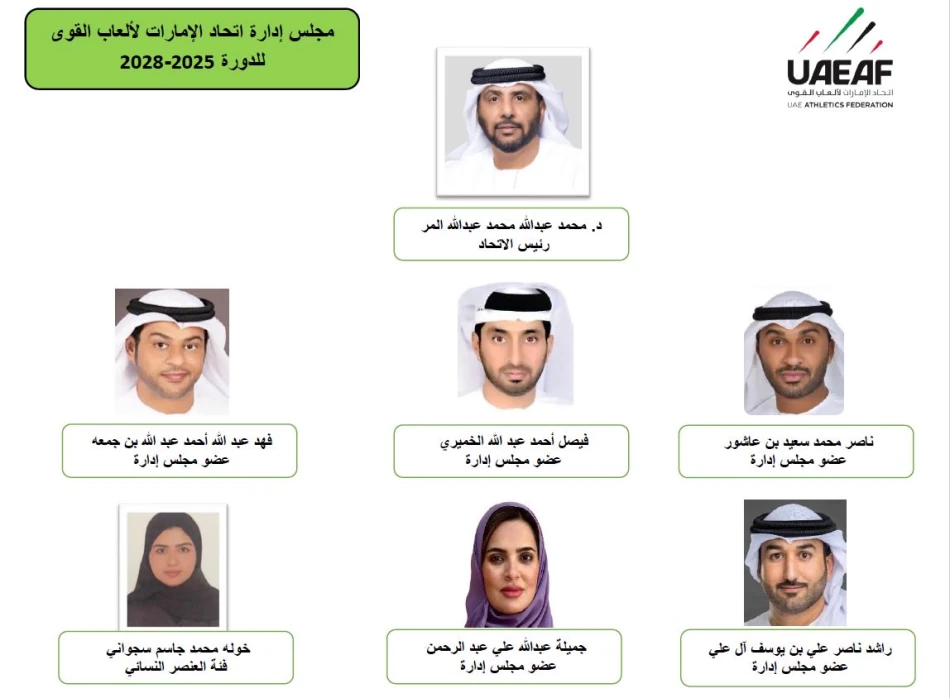
Mohammed Al Mar Retains UAE Athletics Union Presidency Until 2028
UAE Athletics Federation Re-elects Leadership Amid Push for 2032 Strategic Vision
Major General Dr. Mohammed Al Marr has secured a second term as president of the UAE Athletics Federation, winning decisively with 15 votes against challenger Dr. Ibrahim Al Sakkar's eight in Saturday's extraordinary general assembly. The victory positions Al Marr to execute an ambitious long-term strategy extending to 2032, as the UAE seeks to elevate athletics participation and performance on both domestic and international stages.
Electoral Results Signal Continuity and Change
The election, held at Sharjah Cultural Chess Club, saw 23 club representatives participate in selecting the federation's new board for a four-year term through 2028. The voting was supervised by a committee led by Ahmed Said Al Suwaidi, alongside Ahmed Al Jabri and Khalid Al Balushi.
In the board member elections, Sharjah Club's candidate Nasser bin Ashour topped the voting with 18 votes, followed by Masfout Club's Faisal Al Khamiri with 16 votes. Two candidates tied with 14 votes each: Al Rams Club's Fahd Abdullah and Al Nasr Club's Jameela Abdullah, while Al Arabi Club's Rashid Nasser secured 13 votes.
Women's Representation Strengthened
Khawla Sajwani from Sharjah Women's Sports Club won the designated women's seat with 15 votes, defeating Abu Dhabi Athletics Club's Noura Al Ansari, who received eight votes. This outcome reflects the UAE's broader push to enhance female participation in sports governance and competition.
Strategic Vision Extends to 2032
Al Marr's re-election comes with significant promises for transformation. Following the results announcement, he outlined an intensive work program aimed at making athletics appealing to both UAE citizens and residents. The federation has already submitted a comprehensive long-term strategy to the Ministry of Sports, extending through 2032.
"We have submitted a long-term strategy to the Ministry of Sports extending until 2032, and we hope the new board will commit to implementing and developing it to serve the future of the sport," Al Marr stated. "We are committed to turning this vision into reality."
Regional Context and Competitive Landscape
The UAE's athletics development push aligns with broader regional trends, as Gulf nations increasingly invest in sports infrastructure and talent development. Similar to Qatar's pre-World Cup sports investments and Saudi Arabia's Vision 2030 sports initiatives, the UAE appears to be positioning athletics as a key component of its soft power strategy.
The 2032 timeline is particularly significant, coinciding with the Brisbane Olympics and suggesting the UAE may be targeting improved performance at that Games. This long-term planning approach mirrors successful models from countries like Australia and the UK, which have used Olympic cycles to drive systematic sports development.
Governance Structure and Future Challenges
Under federation regulations, the newly elected president retains authority to appoint two additional board members from outside the candidate pool, providing flexibility in assembling expertise. This governance structure will be crucial as the federation navigates the challenge of expanding grassroots participation while maintaining competitive excellence.
The decisive nature of Al Marr's victory suggests strong institutional support for continuity, though the federation will need to demonstrate tangible progress on its ambitious 2032 strategy to maintain stakeholder confidence. With regional competition intensifying and international athletics standards rising, the UAE's athletics federation faces a critical four-year period to establish its long-term trajectory.
Most Viewed News

 Sara Khaled
Sara Khaled






